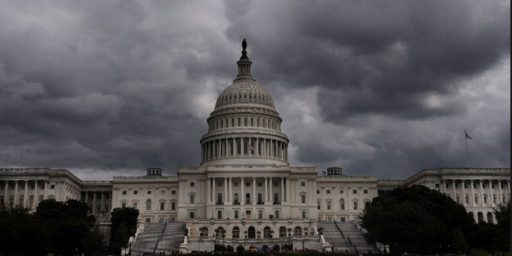The Senate Problem
David Broder, noting that the two men left standing as contenders for the Democratic nomination are both sitting Senators, revisits the question of why such men are seldom elected.
The current Democratic nomination contest is a throwback — a race between two senators whose claim to fame, such as it is, lies in answering roll calls, showing up at hearings and making lots of speeches. Time was when the Democratic presidential field was dominated by senators, but then the party decided it was better off finding candidates from precincts far removed from Capitol Hill.
***
John Kennedy was the last sitting senator to win the White House, which says something about how much voters value the lawmaking and largely rhetorical work of the Senate chamber as preparation for national leadership.
The senators and former senators who lost — Humphrey, McGovern, Mondale and Gore — all were highly regarded by their colleagues and, operating in an era when Democrats usually controlled the Senate, all of them had notable legislative achievements to their credit.
But that counted for little with the voters, who rightly suspect that a body with 100 members is not the best place to develop executive management skills or demonstrate national leadership.
If that was true in the past, it is even truer now, when Republicans have run Capitol Hill for more than eight years.
***
The conventional wisdom is that this election, like most involving an incumbent, will largely be a referendum on George Bush’s record in office. To the extent that is true, either Kerry or Edwards is well equipped for the coming battle. Both have been engaged in a constant critique over the past three-plus years of Bush’s actions, policies and appointments.
Edwards has led some of the Judiciary Committee’s cross-examinations of men and women Bush wanted to place on the federal bench. Kerry has fought the administration on energy legislation and many other fronts.
So if the campaign is about indicting Bush, these guys are probably as good a pair of advocates as their party could put forward — two lawyers well equipped to plead for political conviction of the Republican president.
But at some point in most elections, undecided voters are inclined to ask, “So what have you done that tells me you could handle the presidency?”
That’s when senators often have a hard time answering. The Senate is a remarkable place, but it’s not the real world. And voters know it.
There’s a lot to that, I think. Legislating is simply vastly different from being a chief executive, so governors have a leg up in experience. But a legislative record also brings with it a taint. Senators have a lot of votes on complicated issues that are easy to spin-. Bills are complicated, usually linking a vast number of issues together, so that in order to vote for increased money for AIDS research you have to vote for the David Duke Museum, and to vote against large pork barrel projects you have to also vote against hurricane relief. A 30 second negative ad on one of those votes is hard to counter with another 30 second ad. Further, the nature of legislating is constant compromise, which most voters think of as the polar opposite of principled leadership.






Further, the nature of legislating is constant compromise, which most voters think of as the polar opposite of principled leadership.
I don’t think that’s a “Further,” James, I believe it’s one of the primary points in evaluating the skills of a legislator for the office of President. How is someone who has spent their adult life agreeing to things they don’t like, going to step up and say, “This is the way things are going to be. There’s a principle at stake here.”
Of course, it’s probably just my own conservative leanings that make me think that people want a decisive, principled President. It’s obvious that a lot of people hate that.
—